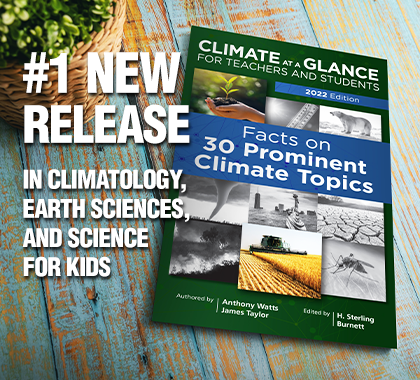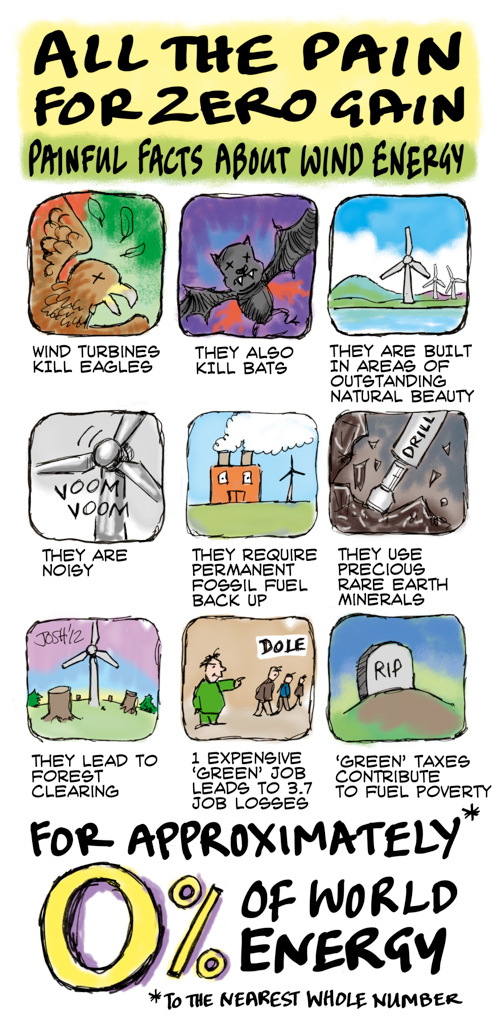YOU SHOULD SUBSCRIBE TO CLIMATE CHANGE WEEKLY.
IN THIS ISSUE:
- Net Zero: Scientifically Unjustified and Deadly
- Podcast of the Week: Sen. Ron Johnson (R-WI) on climate, COVID, and government control
- Recent European Drought Was Not Unusual, Data Show
- Biodiversity Is Not Declining As Steeply As Recently Claimed
- Video of the Week: Climate Change Roundtable TODAY at noon CT
- BONUS Video of the Week: Alex Epstein – Our Fossil Future, Keynote Address at Heartland Institute Climate Conference 2023
- Climate Comedy
- Recommended Sites
Miss Anything at Heartland’s Climate Conference? No Problem.
Net Zero: Scientifically Unjustified and Deadly

Editor’s Note: Presentations and panels at The Heartland Institute’s recently concluded 15th International Conference on Climate Change (ICCC-15) discussed the dangers of the pursuit of “net zero.” Net zero policies are an attempt by ruling elites in governments, bureaucracies, international agencies, and global corporations to force people to reduce their CO2 emissions to as close to zero as possible, with any remaining emissions being reabsorbed from the atmosphere. In the real world, with present technologies, pursuing net zero requires a sharp, near-immediate reduction or full cessation of the use of fossil fuels. A presentation by Heartland Institute Trustee Steve Milloy argued “Net Zero Is Unachievable and Will Kill People,” as the title of his speech put it. On another panel, three presenters discussed “Why NetZero is Impossible: The Continuing Need and Value of Fossil Fuels.”
Although it is undoubtedly important to know whether net zero is achievable and what its relative costs and benefits are likely to be, one should first ask: Are goals or policies to obtain a net zero society necessary or scientifically justified to prevent catastrophic climate change? There is no question that reaching a net zero steady state will require greatly restricting peoples’ liberties, impose huge economic costs, and probably have deadly consequences, both foreseen and unanticipated. Therefore, before embarking on such a wrenching societal transformation, we should be pretty sure the planet needs saving from climate change. If the science does not show catastrophic climate change is on the way, governments must seek other justifications for forcing people to change their lives radically to reach net zero.
So, is net zero necessary? According to a recent paper produced by the CO2 Coalition, the answer to that question is not just no but hell, no! The paper was written by two prominent, multi-award-winning physicists, William Happer, Ph.D., professor emeritus at Princeton University, and Richard Lindzen, Ph.D., professor emeritus at the Massachusetts Institute of Technology, with geologist Gregory Wrightstone, executive director of the CO2 Coalition, each of whom presented on science and policy at ICCC-15.
The remainder of this essay provides a lightly edited excerpt from “Challenging ‘Net Zero’ with Science,” plus quotes from its authors about the paper’s findings.
Reliable scientific knowledge is determined by the scientific method, where theoretical predictions are validated by observations or rejected for failing to conform with reality. Agreement with observations is the measure of scientific truth. Scientific progress proceeds by the interplay of theory and observation. Theory explains observations and makes predictions of what will be observed in the future. Observations anchor understanding and weed out theories that don’t work.
Yet governments around the globe are taking actions to implement fossil fuel-free or “Net Zero” energy systems without a thorough examination of the scientific basis for doing so.
Net Zero—the global movement to eliminate fossil fuels and their emissions of CO2 and other greenhouse gases—is scientifically invalid and a threat to the lives of billions of people. Among the paper’s findings are:
- Net Zero proponents regularly report that extreme weather is more severe and frequent because of climate change, while the evidence shows no increase—and, in some cases, a decrease—in such events.
- Computer models supporting every government Net Zero regulation and the trillions of dollars subsidizing renewables and electric cars, trucks, home heating, appliances, and many other products do not work.
- Scientific research and studies that do not support the “consensus” narrative of harmful manmade global warming are routinely censored and excluded from government reports such as the Intergovernmental Panel on Climate Change and the National Climate Assessment.
- Conclusions of the Intergovernmental Panel on Climate Change that contradict the narrative of catastrophic global warming from fossil fuels are rewritten by government bureaucrats for public reports to support the false narrative of Net Zero.
- The many benefits of modest warming and increasing carbon dioxide are routinely either eliminated or minimized in governmental reports.
- Eliminating fossil fuels and implementing Net Zero policies and actions mean the elimination of fossil fuel-derived nitrogen fertilizers and pesticides, which will result in about half the world’s population not having enough food to eat. Many would starve.
- The adoption of Net Zero is the rejection of overwhelming scientific evidence that there is no risk of catastrophic global warming caused by fossil fuels and CO2.
Net Zero, then, violates the tenets of the scientific method that for more than 300 years has underpinned the advancement of western civilization.
(To paraphrase Johnnie Cochran, “If the science don’t work, you must start again!” Net zero is not justified scientifically, ethically, or economically.—Editor.)
This commentary was first published by the CO2 Coalition on February 23, 2023.
Sources: CO2 Coalition
Podcast of the Week
This week’s podcast is actually a video (because H. Sterling Burnett was busy at Heartland’s climate conference). Watch U.S. Senator Ron Johnson (R-WI) address conference attendees. The senator talks about COVID, climate, and how the left and the government have exploited both “crises” to grab more control over your life.
To see all the presentations at The Heartland Institute’s 15th International Conference on Climate Change (ICCC15) held in Orlando on Feb. 24-25, visit the climate conference site.
Subscribe to the Environment & Climate News podcast on Apple Podcasts, iHeart, Spotify or wherever you get your podcasts. And be sure to leave a positive review!
Get your Copy at Amazon TODAY!
Recent European Drought Was Not Unusual, Data Show
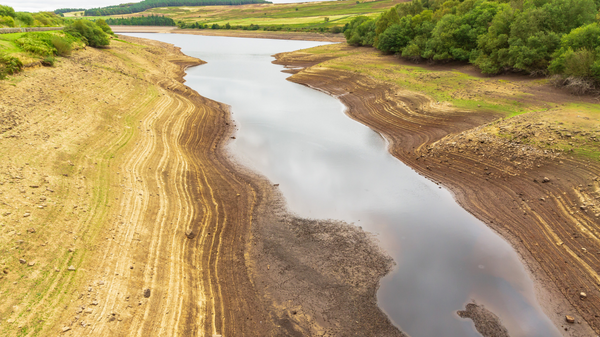
An analysis of the data behind a paper published in Nature Communications (NC) refutes the authors’ claims that the recent widely publicized severe summer drought in Europe was a rare occurrence based on the historical record since 1600. The researchers for the NC paper used proxy data from an isotope analysis to reconstruct past temperature and moisture trends from 1600 to 1950, using direct temperature and soil moisture measurements for the years since then up to 2018.
The authors of the NC paper conclude, “We show that the recent European summer drought (2015-2018) is highly unusual in a multi-century context and unprecedented for large parts of central and western Europe.” Interestingly, some hydroclimatic variability over multiple centuries may be tied to solar activity, the authors note.
A reanalysis of the report published on Climate Etc. (CE) finds the paper’s conclusion is unjustified by the data used and is instead largely an artifact of the method chosen to remove “noise” from the data and the time periods over which the data was averaged. The NC paper smoothed the data with a mathematical algorithm to remove “noise”—extraneous factors—from the dataset. The authors of the reanalysis explain, “All smoothing filters struggle with the beginning and the end of a filtered dataset. They estimate the output because there are no precursors/successors in the raw data.”
The researchers conducting the reanalysis found if one applied a similar but different filter to a shorter time period ending the reconstruction in 1949, a paper in published in 1950 based on the analysis would have concluded unusual hydroclimate conditions obtained then similar to the ones it found between 2015 and 2018.
In other words, the observation of a recent steep decline in moisture is “an artefact of the used filter,” the CE report states.
The authors then applied to the NC study’s dataset a simple running mean filter commonly used to reduce short-term overshoots or noisy fluctuations in a dataset over time. They found the European summer hydroclimate from 2015 through 2018 was not unusual. The reanalysis found recent hydroclimate conditions are within the range of historical natural variability.
As another way of ascertaining whether the hydroclimatic conditions from 2015 to 2018, the endpoint of the NC study, were in fact highly unusual or are within the range of historic trends and variability, the authors of the CE reanalysis averaged the data in four-year segments instead of the 13-year averaging used in the original study, calculating those averages from 1600 through 2018. The CE reanalysis found multiple times of excessive dryness: 1947-1950, 1946-1949, 1945-1948, 1944-1947, 1892-1895, 1760-1763, 1759-1762, 1738-1741, and 1688-1691.
Averaging the hydroclimatic conditions over different time periods, such as five years, produced 10 separate periods of negative Standardized Precipitation Evapotranspiration Index (SPEI) values (a relative measure of surface water surplus or deficit with respect to hydroclimate conditions used in the NC paper) which were drier than the summer drought Europe experienced from 2015 to 2018. Averaging the SPEI over 10-year periods produced 10 separate periods prior to 1950 when the SPEI values were more negative than the 2015 to 2018 period which the NC study had found “highly unusual.”
The reanalysis eliminates the justification for the NC study’s conclusion that the drought conditions across much of Europe from 2015 to 2018 were highly unusual and provide “further evidence of European summer droughts potentially being influenced by anthropogenic warming.” The NC study’s conclusion is a product of the method used to reduce noise in the data and the time period selected over which to calculate running averages. The data indicates past multiyear periods of drought in Europe were drier or at least as dry as the present, during times long before humans began to emit substantial amounts of carbon dioxide into the atmosphere.
Sources: Climate Etc.; Nature
Biodiversity Is Not Declining As Steeply As Recently Claimed

A recent report published by the World Wildlife Fund (WWF) and the Zoological Society of London (ZSL) which claims vertebrate numbers across the planet have declined by 69 percent since 1970 has been refuted by two independent groups of scientists.
The Living Planet Index (LPI), compiled by the WWF and ZSL, is produced biannually, most recently released to coincide with the U.S. COP 15 Biodiversity Summit in Montreal from December 7 through December 19. Based on a sampling of 32,000 populations of animals from more than 5,000 species, the LPI estimated one million species of plants and animals are threatened with extinction, based on the rate of decline since 1970.
Two separate groups of scientists have reanalyzed the previous and present LPI reports and found the estimated rapid decline of a high number of species in both reports is due to the inclusion of a small number of steeply declining species in the wider analysis skewing the scale of decline.
A group of six scientists from universities and research institutes in Canada, the United Kingdom, and the United States looked at the previous LPI report, which claimed there had been a 50 percent decline in vertebrates since 1970, implying an absurdly high 19 percent increase in vertebrate loss between the 2020 and 2022 analyses. The analysis found the steep decline reported in the previous LPI was, as the Daily Sceptic writes, a “statistical freak” driven in large part by just 2.4 percent of the wildlife populations sampled.
“If these extremely declining populations are excluded, the global trend switches to an increase,” wrote the authors of the reanalysis in a paper published in Nature. The following figure depicts the changes from what the earlier analysis found:
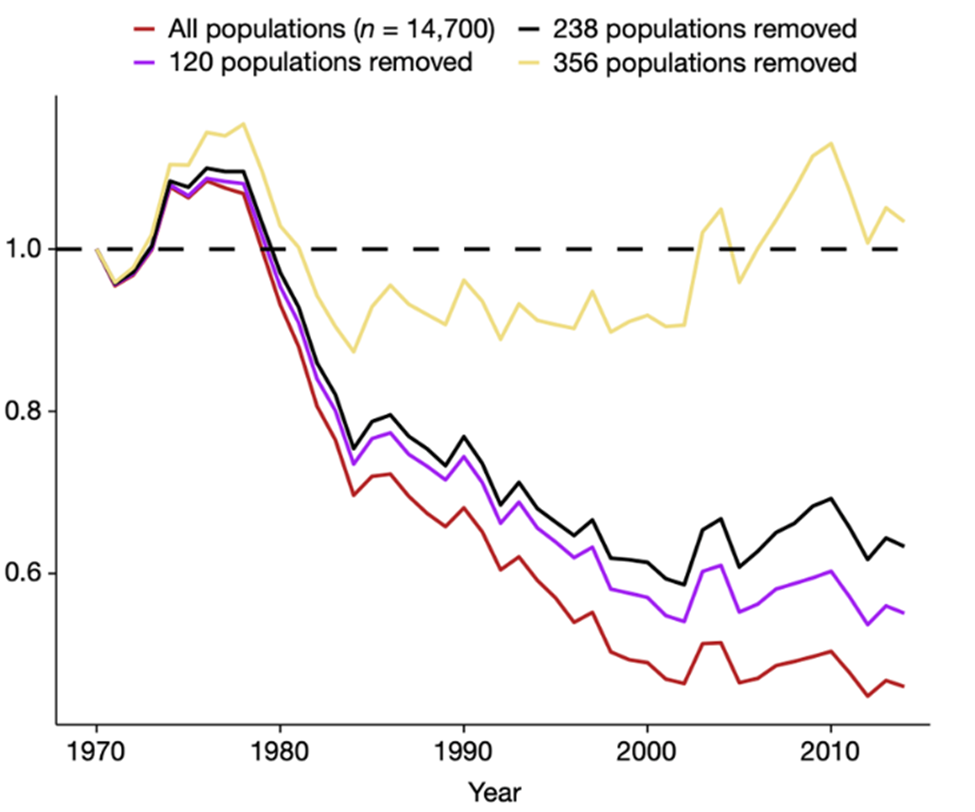
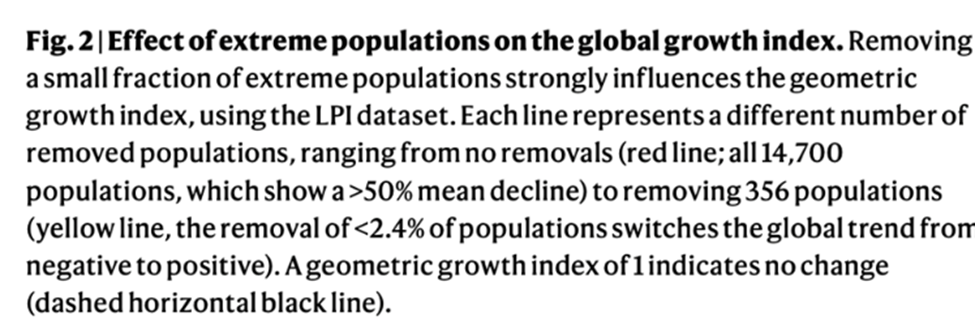
The Nature paper suggests future LPI analyses select a different method for accounting for species decline that doesn’t give so much weight to extreme outliers in the dataset:
We propose an alternative approach, which identifies clusters of extreme decline (or increase) that differ statistically from the majority of population trends.
We show that, of taxonomic-geographic systems in the Living Planet Index, 16 systems contain clusters of extreme decline (comprising around 1% of populations; these extreme declines occur disproportionately in larger animals) and 7 contain extreme increases (around 0.4% of populations). The remaining 98.6% of populations across all systems showed no mean global trend.
Accounting for extreme clusters fundamentally alters the interpretation of global vertebrate trends and should be used to help to prioritize conservation efforts.
Among the weakest points of the most recent report is its discussion of corals. The LPI claims “a 0.3°C warming would result in a loss of up to 90% of warm water coral,” which is directly refuted by evidence presented in “Climate at a Glance: Coral Reefs” and “Climate at a Glance: Great Barrier Reef,” which show coral thrive in warm water, not cold water, and recent warming has allowed coral to expand their range poleward while still thriving near the equator. Species of coral have existed continuously for the past 40 million years, surviving temperatures and carbon dioxide levels significantly higher than today’s.
It seems that instead of learning from their mistake, the WWF and ZSL doubled down on the use of extreme outliers in the most recent report.
A group of Finnish biologists examining the most recent LPI conclude the WWF and ZSL calculations once again overrepresented the effect of extreme outliers. Their critique suggests the problem is even worse that initially thought, because the way the LPI is calculated measures proportional declines or increases, not actual abundance. As the Daily Sceptic summarizes the Finnish analysis,
The LPI measure is biased downwards because proportions are measured, not actual abundance. In fact, the more populations vary in their rate of increase or decrease, “the more downwardly biased the LPI will be as a measure of abundance.” Even worse, the scientists go on to show, the downward past bias is baked into future calculations, since previous index values are multiplied with the current one [and as a result] … the trouble with the LPI methodology “is deeper … and cannot be resolved by removing extreme population trends from the analysis.”
The reanalyses of the LPI’s methodologies and results strongly suggest its projections of a pending high number of extinctions unless fossil fuel use is sharply and immediately curtailed are unjustified. Only time and further research will determine whether the LPI or its critics more accurately portray the changes in global species numbers and the percent possibly threatened with extinction. Even when that is determined, science will still have to grapple with the causes of the decline, which current data suggest are highly unlikely to be tied to a catastrophic climate change.
Source: The Daily Sceptic; Living Planet Report; Nature
Heartland’s Must-read Climate Sites
Ecoterrorism? Railroads vs. Pipelines
In this episode of Climate Change Roundtable, we are going to look and the good, the bad, and the ugly things that came in the aftermath of the The Heartland Institute’s 15th International Conference on Climate Change (ICCC15) held Feb. 24-25 in Orlando.
Spoiler: One of the good things that came out of the conference is the realization that a you woman of style, grace, and intelligence is stepping up to be the “anti-Greta.” And, she’s from Germany, so this will mark our first “international” edition of CCR. Also, some predictable, yet pretty ugly things came out of the conference too. Some people just “can’t handle the Truth!”
We’ll factually impale those folks in a fun way. Join us at 1PM EST Friday (12 PM CT) with our host Anthony Watts, and our regular panelists Sterling Burnett, and Linnea Lueken, for what promises to be a raucous and fun show.
Tune in to Climate Change Roundtable live every Friday at 1 pm CT, 12pm CT.
Alex Epstein – Our Fossil Future, Keynote Address at Heartland Institute Climate Conference 2023
Author and philosopher Alex Epstein gave a keynote address on the first night of The Heartland Institute’s 15th International Conference on Climate Change (ICCC15) held in Orlando on Feb. 24-25. We polled our audience, and this was one of the most popular aspects of the entire conference. He talks about our Fossil Future, which also happens to be the title of his latest book.
To see all the presentations, visit the climate conference site.




